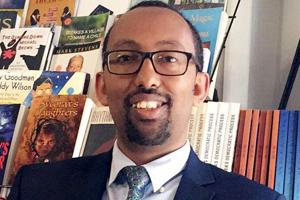Achievements
Maximum Impact: Grad Student Explains the Importance of Helping Farmers

When School of International Service graduate student Ephrem Tesfaye Woldegiorgis applied for the Kirchner Food Fellowship, much of the work was right in his wheelhouse. After all, he’d helped rural areas in his native Ethiopia, and in 2018, he started the SIS master’s program in international development with a concentration in agriculture and rural economic institutions.
But one major component of the Kirchner fellowship was new territory: “I’m actually working on an investment committee now. This is new for me, and I’m learning a lot of new things already,” says Woldegiorgis. “I’m meeting a lot of wonderful people. And with this program, throughout the year, we have the opportunity to meet investors and inspirational leaders.”
In an interview, Woldegiorgis discussed his work with SIS and Kirchner. And, coinciding with World Food Day on October 16, Woldegiorgis explained the importance of rural farmers to the food production process.
Kirchner Fellowship
Woldegiorgis started the Kirchner fellowship over the summer and it will last about 10 months. Along with other students on the investment committee, they’ll evaluate potential agribusinesses and outside companies focused on social impact. When the students find the right match, Kirchner will invest about $50,000 toward that company’s work in agricultural development.
“The Kirchner group says, ‘okay, companies are earning money, but let’s give back. Let’s help those who are disadvantaged,’” he says. “That’s why the Kirchner work is important to me.”
Woldegiorgis and the other Kirchner fellows also get training from experienced directors and other business professionals, and the program empowers them to grow their professional network.
‘It Has to Be Agriculture’
Woldegiorgis hails from Dessie, in northern Ethiopia. Though he describes it as an urban town, he also had plenty of exposure to agrarian communities. He earned his undergraduate degree in economics from Unity University and then got a master’s in development economics at Ethiopian Civil Service University.
He says that roughly 80–85 percent of Ethiopians live in rural areas, and he eventually saw the need to invest more resources there. “That’s why I say, ‘it has to be agriculture.’ That’s the best way we can have an impact, reduce poverty, and increase food security,” he says.
Unfortunately, not enough dollars are directed toward those rural communities, he explains. Stakeholders often think investing in farmers is a risky bet. “They live scattered in different areas. They are illiterate, for the most part, and they don’t have a voice,” he says.
But through his own personal work experience, he came to see things differently. After grad school in Ethiopia, he worked for ACDI/VOCA, a US-based nonprofit. In working on USAID-funded projects, he helped get $176 million in loans and investments distributed to co-ops and agribusinesses for market development.
“It was more money than what we expected, and it showed that it could work,” he says. “Agriculture isn’t as risky as you think. The people are really reliable.”
Making Coffee and Sharing Profits
Woldegiorgis later became a supply chain manager for Moyee Coffee. In discussing his work now, he relays a little-known, but illuminating, fact: The first coffee plant cultivated—coffea arabica—originated in Ethiopia. And he says it’s still arguably the nation’s most important commodity. But despite the wealth it creates—to exporters, for instance—coffee farmers are still poor.
“We thought, ‘how can we correct this?’ We can do projects or campaigns, but these are not sustainable solutions. These are short-term remedies,” he says. “We needed to find social entrepreneurship companies with a social concern, so that farmers are also considered. It’s not that farmers don’t work hard. It’s just that the system spits them out.”
He says Moyee Coffee partnered with the farmers, providing them training, helping them harvest quality coffee, and then paying them above market price for the product. “It should be a win-win for everybody, so farmers get more money and income,” he says. “They can have a better life, which they deserve.”
Taking It Global
He’s hoping to take what he learned at Moyee Coffee and apply it to other companies and other parts of the world. That’s why he decided to apply to the SIS program, and he plans to focus his efforts on impoverished rural areas of Sub-Saharan Africa.
“I want to make an impact on a bigger scale. To do that, this is not something you can do only in Ethiopia,” he says. “A lot of the development actors are here in the US. So I want to increase my network and get exposure to what the international experience looks like.”
This is Woldegiorgis’s first time ever in the US, and so far, he feels like everything is going according to plan.
“The US and DC are exactly what I expected. It’s a very friendly and warm environment,” he says. “And in case I miss my Ethiopian food, I just go to the Ethiopian community around DC.”